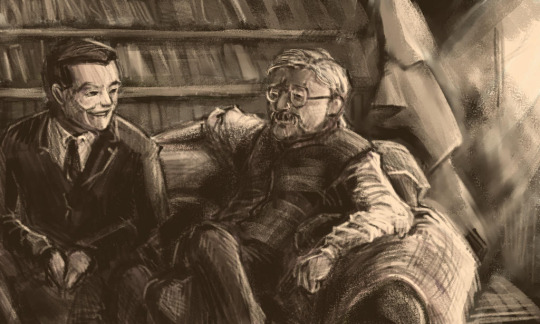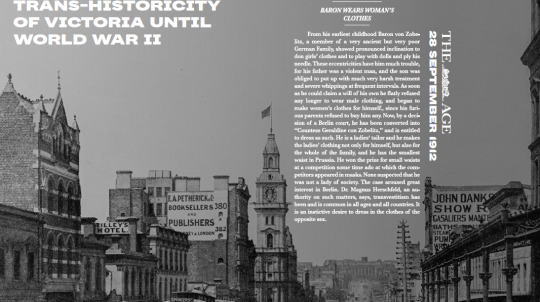#magnus herschfeld
Explore tagged Tumblr posts
Text
Just in case anyone was curious, Magnus Herschfeld who ran the transgender healthcare clinic that served as the site for the Nazi's first book burning on May 6 1933 was also Jewish. In fact, Hitler called Herschfeld Germany's most notorious Jew. So transgender and Jewish people were allies during WWII.
Stop trying to drive a wedge between us and pick up a book, you eugenicist fucks.
Happy Transgender Day Of Visibility🏳️⚧️

49K notes
·
View notes
Text

Sketch of Li Shiu Tong and Magnus Hirschfeld.
Based on this photo I stumbled upon while reading up on the Institut für Sexualwissenschaft and various people associated with it.
Drew this on a Saturday night, instead of going out and rocking the town ;p
#krita artwork#krita illustration#drawn with krita#digital drawing#digital sketch#sketch drawing#li shiu tong#magnus herschfeld#tao li#20th century#gay couple#lgbt history#people in history#germany#china#pride month#june 2023
4 notes
·
View notes
Text
Reading about queer discourse in the 1930s like

#yikes#happy pride i guess#you had us in the first half not gonna lie#this is a callout post @ magnus herschfeld
0 notes
Text
someone should make a musical about magnus herschfeld.
queer/trans/gnc people living their best life in an apartment building together? a bunch of people trying to prove that queer/trans/gnc people are real? nazis burning all of their work and them fighting anyway?
I mean, the story writes itself.
#agender#gender nonconforming#genderqueer#nonbinary#gender crisis#chronic illness#chronically ill#mentally unstable#chronic illness positivity#chronic pain#musical#transgender#trans rights#trans pride
3 notes
·
View notes
Text

The following is from Victoria’s Transgender History, a report on Australian trans history in the state of Victoria (the entire report is available at the link). It is a quote from one of Australia’s most prominent papers, The Age, dated 28 September, 1912 and offers an insight into both German trans history in the early 20th Century, and the public awareness of, and discourse around, trans people in the same time period. Note that while the language used is period-typical (transvestite, where we can clearly see that Countess von Zobelitz would be a trans woman in modern terms) and misgenders her throughout, that the tone of the article nonetheless reflects more of a sense of curiosity, empathy and a commitment to educating the reader with reference to a suitable expert (in this case, quoting no less a person than Dr Magnus Herschfeld- @uranianrights you may be interested in this). There is also a great deal implied about the acceptance of Countess von Zobelitz and her social transition in Berlin.
The image used shows the Melbourne skyline in the 1910s. An article from The Age is printed between the spire of the General Post Office and the opposite side of Elizabeth Street. The article reads:
Baron Wears Woman’s Clothes
From his earliest childhood, Baron von Zobelitz, a member of a very ancient but very poor German family, showed pronounced inclination to don girls’ clothes and to play with dolls and ply his needle. These eccentricities gave him much trouble, for his father was a violent man, and the son was obliged to put up with much very harsh treatment and severe whippings at frequent intervals. As soon as he could claim a will of his own he flatly refused any longer to wear male clothing, and began to make women’s clothes for himself, since his furious parents refused to buy him any. Now, by a decision of a Berlin court, he has been converted “Countess Geraldine von Zobelitz”, and is entitled to dress as such. He is a ladies’ tailor and he makes the ladies’ clothing not only for himself, but also for the whole of the family, and he has the smallest waist in Prussia. He won the prize for small waists at a competition some time ago at which the competitors appeared in masks. None suspected that he was not a lady of society. The case aroused great interest in Berlin. Dr Magnus Herschfeld, an authority on such matters, says transvestitism has been and is common in all ages and all countries. It is an instinctive desire to dress in the clothes of the opposite sex.
#trans history#lgbtq+ history#history of gender#queer history#20th century#german history#australian history#misgendering tw#abuse tw#period-typical language
8 notes
·
View notes